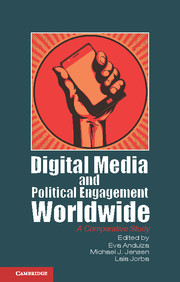Book contents
- Frontmatter
- Contents
- List of Tables and Figures
- Contributors
- Acknowledgments
- Introduction
- 1 The Impact of Digital Media on Citizenship from a Global Perspective
- 2 Recent Shifts in the Relationship between the Internet and Democratic Engagement in Britain and the United States
- 3 Political Engagement and the Internet in the 2008 U.S. Presidential Elections
- 4 Online Political Participation in the United States and Spain
- 5 Internet Use and Political Attitudes in Europe
- 6 Digital Media and Offline Political Participation in Spain
- 7 Online Participation in Italy
- 8 On the Causal Nature of the Relationship between Internet Access and Political Engagement
- 9 The Uses of Digital Media for Contentious Politics in Latin America
- 10 Opening Closed Regimes
- 11 Digital Media and Political Attitudes in China
- Conclusion
- References
- Index
7 - Online Participation in Italy
Contextual Influences and Political Opportunities
Published online by Cambridge University Press: 05 July 2012
- Frontmatter
- Contents
- List of Tables and Figures
- Contributors
- Acknowledgments
- Introduction
- 1 The Impact of Digital Media on Citizenship from a Global Perspective
- 2 Recent Shifts in the Relationship between the Internet and Democratic Engagement in Britain and the United States
- 3 Political Engagement and the Internet in the 2008 U.S. Presidential Elections
- 4 Online Political Participation in the United States and Spain
- 5 Internet Use and Political Attitudes in Europe
- 6 Digital Media and Offline Political Participation in Spain
- 7 Online Participation in Italy
- 8 On the Causal Nature of the Relationship between Internet Access and Political Engagement
- 9 The Uses of Digital Media for Contentious Politics in Latin America
- 10 Opening Closed Regimes
- 11 Digital Media and Political Attitudes in China
- Conclusion
- References
- Index
Summary
Introduction
As in other Western democracies, the internet has become an increasingly viable environment for political participation in Italy. At the time of this writing, the latest and most powerful demonstration of the new media's effectiveness in helping people self-organize for political action was the “No Berlusconi Day,” a rally held in Rome on December 5, 2009, to request the resignation of center-right Prime Minister Silvio Berlusconi after a wave of scandals. The demonstration – organized entirely online, mostly via blogs and the social networking site Facebook – partnered effectively with various left-wing media, successfully branded itself by using the violet color (which no political party in Italy has ever used, thus giving the initiative a nonpartisan allure), and gathered a remarkable amount of people. Before that, the internet had been successfully used to mobilize citizens by the movement against neoliberal globalization (Mosca 2010) and by Beppe Grillo, a comedian whose blog has become the most read political blog in Italy, and whose supporters, mostly collaborating online through MeetUp.com groups, helped organize various rallies against political malfeasance and corruption. The first and biggest of these occured on September 8, 2007, when fifty thousand people gathered in the main event in Bologna and related rallies were hosted in 225 Italian cities and 30 foreign ones (Vaccari 2009); Grillo's supporters and the movement against globalization subsequently organized citizen lists that ran in various local elections between 2008 and 2010, polling as high as 10 percent in some constituencies (Mosca 2010).
By contrast, institutional political parties and their candidates have been quite reluctant to fully embrace the internet's participatory potential, mostly due to their bureaucratic nature and reluctance to cede control over message production and distribution, as well as the relatively low levels of internet diffusion in Italy (Bentivegna 2006; Vaccari 2008a, 2008b). Although this aloofness from political insiders has limited the avenues for online participation, it has also provided a window of opportunity for citizens, associations, and social movements, which have not found the online political battlefield occupied by institutional political actors and have thus enjoyed greater freedom to experiment and less-than-fierce competition from more resourceful players.
- Type
- Chapter
- Information
- Digital Media and Political Engagement WorldwideA Comparative Study, pp. 138 - 159Publisher: Cambridge University PressPrint publication year: 2012
- 4
- Cited by



